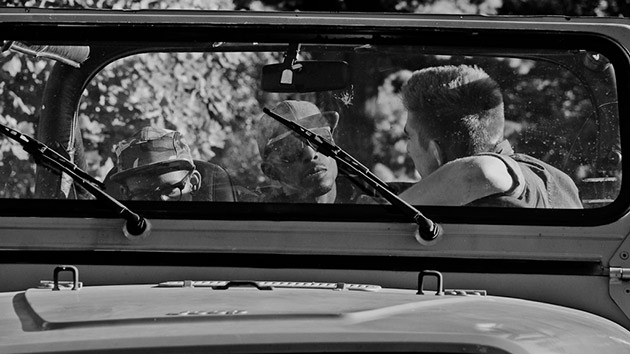An Evolution of Friends
I don't want to talk about race. Doing so would limit the discussion around Cronies, the Spike Lee-produced entry at Sundance 2015, to a debate about stereotypes, racism and culture. To be fair, all these elements are baked into the script, written by director Michael J. Larnell, who is also a student of Lee's at NYU.
The true meat of the story, however, is found in a friendship between three men entering adulthood. Shot in black and white with flashbacks in color, the film draws influence from La Haine, She's Gotta Have It, and the unbridled camaraderie of Stand by Me.
The central character is Louis (George Sample III), who has been friends with Jack (Zurich Buckner) since childhood. The narrative is propelled by the inherent rivalry between Jack and Andrew (Brian Kowalski), the newbie to the trio. Andrew is forced to prove himself to Jack and, simultaneously, the old friendship between Lewis and Jack is undergoing growing pains.
The strain on the older friendship provokes unexpected twists and turns in the plot. Larnell uses several different urban-drama tropes to encourage certain audience expectations, then promptly undermines the clichés with nuanced performances and less drama. The whole scenario feels much more honest than those found in a lot of similar films, touching on loyalty, betrayal and coming of age in a tough urban culture.

They are completely different movies in almost every other sense, but the pacing and ambitious indie spirit of Cronies reminds me of one of the most famous films to debut at Sundance, Clerks. They're both buddy flicks. Larnell's shots are just long enough to feel contemplative, but not so long as to force unnecessary drama. Most of the shots are relatively static, with a tiny hint of handheld wobble, and simple panning, if any movement at all. As a result, the whole film is wonderfully understated. Larnell and cinematographer Federico Cesca utilize a pseudo-documentary style that makes the film feel true to life. One of the characters is an interviewer whose name we never learn, and whom we never get to see, even when Jack challenges his neutrality by attempting to turn the camera on him.
Although loaded with symbolism, Cronies manages to avoid being heavy-handed. The characters represent a changing (and unchanging) cultural landscape through the specificity and intimacy of their personal conflicts. Larnell doesn't homogenize his characters at all, yet the message of the film reinforces the belief that we are bonded more through socioeconomics and choice than by the color of our skin. Cronies does this beautifully in part by skirting the topic of race until the very end of the film, when Andrew finally shares his thoughts on the topic in a brief, humorous and self-aware discussion with the interviewer of this pseudo-documentary. In this, there is hope.
Watch our video interview with Cronies director Michael J. Larnell »
Did you enjoy this article? Sign up to receive the StudioDaily Fix eletter containing the latest stories, including news, videos, interviews, reviews and more.
